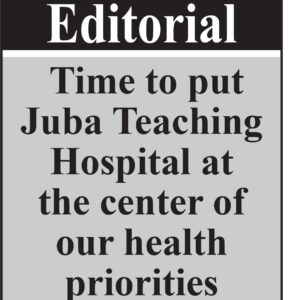
When South Sudan’s Minister of Health, pledged to strengthen service delivery at Juba Teaching Hospital, many citizens must have breathed a sigh of relief. At last, they hoped, the country’s leading health institution would receive the attention it deserves.
While the pledge to support is always gesture, it must not remain a well-intentioned conversation or a strategic political statement that fades with time.
As the national referral and teaching hospital, Juba Teaching Hospital should be the flagship of South Sudan’s healthcare system: a place where patients receive quality treatment, future doctors are trained, and innovation in service delivery thrives.
Yet the reality is sobering. The hospital continues to operate under immense strain; overcrowded wards, aging infrastructure, and a chronic shortage of specialized personnel. The Minister’s acknowledgment of these challenges shows that she understands the stakes. But understanding alone is not enough.
Juba Teaching Hospital must be the first choice for treatment not only for ordinary citizens but also government officials. The practice of seeking specialized care abroad is costly and undermines public confidence in our own health system.
It is time for the government to act decisively. That means allocating sufficient resources, accelerating infrastructure upgrades, and investing in the training and retention of medical staff. It also means ensuring the hospital is not merely functional, but exemplary. Follow-up meetings must lead to measurable outcomes: expanded capacity, improved patient care, and restored dignity for those who walk through its doors.
If South Sudan truly seeks to build a resilient health system, it must begin by transforming Juba Teaching Hospital into a center of excellence where every citizen, including our leaders, can access world-class care at home.



